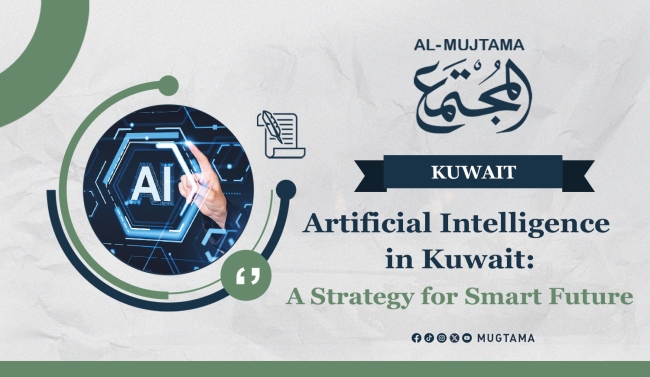Artificial Intelligence in Kuwait: A Strategy for Smart Future
Kuwait is striving to achieve sustainable development in the field of artificial intelligence through a comprehensive strategy aimed at enhancing innovation and economic growth using modern AI technologies. This strategy represents an important step towards realizing Kuwait's Vision 2035, as it seeks to build an advanced digital infrastructure and enhance competitiveness through these advanced technologies.
1. Promoting Responsible Artificial Intelligence in Kuwait
The Strategy:
The Kuwaiti government considers artificial intelligence a significant responsibility that requires an organized approach to ensure the development of this technology in a safe and responsible manner. One of the government's goals is to implement regulatory and security frameworks to ensure that AI technology is used safely and effectively across all sectors.
The measures taken include enhancing human oversight of intelligent systems, integrating security and resilience measures to ensure no negative impact on critical infrastructure.
Future Directions:
Kuwait aims to ensure that artificial intelligence remains a tool for promoting sustainable growth, while ensuring ongoing collaboration between the government, industry, and civil society to achieve the best outcomes.
2. Enhancing Data Management and Technological Infrastructure to Support AI
Improving Data Management:
Data is the primary engine of artificial intelligence technology; therefore, Kuwait is focusing on improving methods for data collection, organization, and security. This includes enhancing centralized data storage systems while ensuring quality and security, as well as developing secure platforms for data sharing between government entities and companies.
Enhancing Digital Infrastructure:
Kuwait aims to improve communication networks and increase storage capacity to support artificial intelligence technology, while developing cybersecurity systems to ensure the secure integration of modern technologies.
3. Coordinating Stakeholders for AI Governance
Coordination of Collaboration:
To ensure the effective implementation of the national AI strategy, the Kuwaiti government has launched a steering committee comprising representatives from various government entities, the private sector, and the academic community. This committee aims to ensure coordination between different parties and identify the best ways to use artificial intelligence across vital sectors.
4. Empowering the Workforce in the Age of Artificial Intelligence
Skill Development:
Kuwait will offer specialized training programs to meet the growing workforce needs in the field of artificial intelligence. This includes updating academic curricula and providing training courses to empower youth and professionals to acquire the necessary skills to work in this evolving field.
Awareness:
Public awareness campaigns will also be organized to educate citizens about the benefits of artificial intelligence and how to leverage it in their daily lives.
5. Building a Comprehensive Artificial Intelligence Ecosystem
Supporting Innovation and Entrepreneurship:
Kuwait aims to promote innovation by establishing incubators and centers for developing startups in the field of artificial intelligence. These initiatives aim to attract local and international investments and provide financial and technical support to emerging companies.
International Collaboration:
Kuwait will work to build partnerships with other countries and international organizations to exchange knowledge and enhance innovation in this field.
6. Kuwait’s Roadmap for Artificial Intelligence
Short-term Opportunities:
- Launching the national artificial intelligence strategy.
- Initiating pilot projects across multiple sectors.
Medium-term Opportunities:
- Expanding pilot projects and broadening the scope of artificial intelligence applications.
- Improving digital infrastructure.
Long-term Opportunities:
- Ongoing investment in skill development.
- Adopting new technologies to stimulate innovation and sustainable growth.
7. Monitoring the Implementation of the National Artificial Intelligence Strategy
Continuous Evaluation:
The progress of implementing the artificial intelligence strategy is monitored by identifying key performance indicators (KPIs) and regularly collecting data to assess the effectiveness of the measures taken. Regular reports on the progress made will be presented, and efforts will be independently evaluated to ensure adaptation to future challenges.
Kuwait’s strategy in the field of artificial intelligence is a key step toward achieving Kuwait Vision 2035, which seeks to build an advanced digital economy. By enhancing infrastructure, developing the workforce, and integrating artificial intelligence across various sectors, Kuwait will strive to become one of the leading countries in this field.
----------------------
Source: Central Agency for Information Technology


